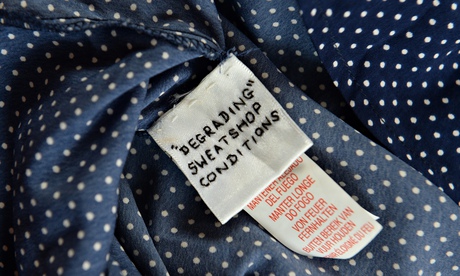According to the Guardian, a couple of weeks ago, a shopper has come forward, claiming that a label which reads ‘”Degrading” sweatshop conditions’ was sewn into a Primark top bought in Swansea in 2013. Primark has started some investigation and hopes the label will turn out to be a oak. Indeed, Primark, unlike other retailers who have admitted to a presence in the Rana Plaza factory, has contributed to the compensation fund redistributed to the Rana Plaza’s workers.
 Photograph: Darren Britton/Wales News Service
Photograph: Darren Britton/Wales News Service
Oak or not, this reminds us that improving the conditions of work of apparel workers remains a critical issue. Read more here :
Extract from “This cry for help on Primark label can’t be ignored” (by susanna Rustin, theguadian.com, Wednesday June 25th 2014) :
“…. One anonymous senior executive from a big high street retailer recently told the Guardian that shoppers “don’t care” about conditions, and research shows most “prefer inexpensive over respect for human rights”. If consumers were more bothered about workers, goes this argument, the industry would progress.
Campaigners, including the designer Katharine Hamnett, call this a cop-out. Differences between retailers are proof that they, too, drive change. European brands have gone further than those in the US in their support for Bangladeshi trade unions in the aftermath of the Rana Plaza catastrophe, though Matalan and Benetton have yet to make any contribution to the compensation fund despite admitting links with the factory.
But it is true that the rise of ethical shopping, or what US sociologist Juliet Schor calls “conscious consumption”, has made limited headway in fashion. It is possible to choose free-range over factory-produced eggs even in convenience stores; much harder to opt to pay a premium of a couple of pounds for a T-shirt that comes with ethical plus points.
In part this is down to the sheer complexity of the fashion supply chain. Perhaps the most poignant and ironic thing about the message in a Primark dress, is that as far away as the machine operators in the stitch-and-sew factories of Bangladesh and elsewhere might appear, they are far closer to us than most of the other millions of people involved in making our clothes.
Thanks in part to the publicity surrounding the Rana Plaza disaster, we can at least imagine the men and women who sew them. But before a cotton dress is cut and stitched it is dyed and printed; before that it is woven from yarn into cloth; before that it is spun from raw cotton into yarn. And before that it is planted, picked, and ginned (or cleaned). Cotton is an agricultural commodity and the world’s most important non-food crop, grown on all five continents and by some of the poorest people in the world…”